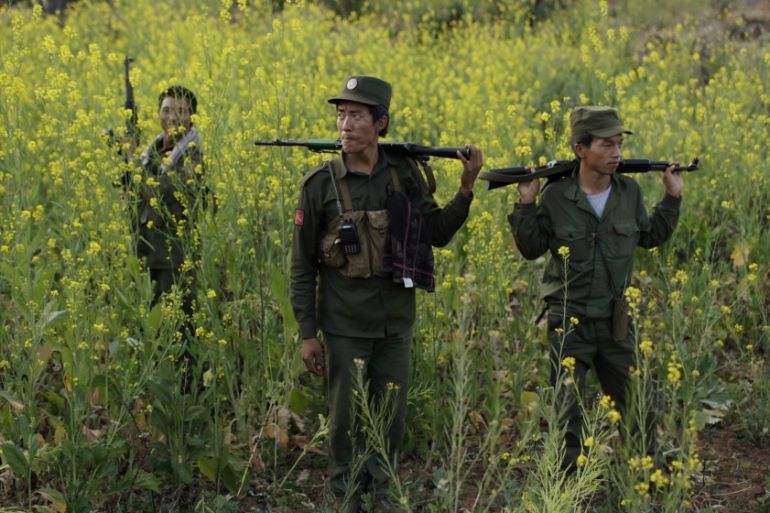Report: Myanmar officials conspired to steal land
Group accuses government and military officials of grabbing land from ethnic minorities under guise of privatisation.

Yangon, Myanmar – International rights group Global Witness has accused high-ranking government and military officials, along with business tycoons, of conspiring to confiscate hundreds of thousands of acres of land from ethnic-minority villagers in Myanmar.
In the report released on Thursday, titled Guns, Cronies and Crops, Global Witness says Myanmar’s armed forces, known as Tatmadaw, seized large swaths of land under the guise of a nationwide privatisation programme.
Keep reading
list of 4 itemsLost Futures
Photos: Greek valley that became a lake stirs drought debate
Botswana threatens to send 20,000 elephants to Germany
The programme was designed to retain profitable state assets and natural resources in anticipation of sweeping reforms that came with a new quasi-civilian government in 2011.
“By 2013, 5.3 million acres of land – thirty five times the size of Yangon – had been leased out to investors for commercial agriculture, the majority without the consent of its owners,” the report says.
According to the interviews in the report, which are concentrated in northern Shan State, at least three ethnic minority groups have suffered as a result of land grabbing.
In Lashio district, 5,450 villagers composed of Kachin and Shan minorities were affected by land grabs exceeding 3,400 acres, most of which was seized in 2006. It further says that another 377 Shan and Palaung villagers in the self-administered territory known as Wa were victim to land grabbing in 2006.
“Following almost 50 years of military rule, Myanmar’s politics and economy is supposedly being disentangled from the Tatmadaw’s grip,” Josie Cohen, land campaigner for Global Witness, said in a statement released in conjunction with the report.
“But in many cases the army has merely swapped its uniforms for suits, with military officials and their cronies retaining firm control of the country’s land sector.”
Hundreds of complaints
Those accused as the main benefactors include the current Minister of Agriculture and Irrigation U Myint Hlaing, the Manpang People’s Militia, current members of parliament U Shauk Chang and U Kyin Wong and the Sein Wut Hmon Group, a private, locally-based conglomerate.
According to the report, the parliament-backed Farmland Investigation Commission received 565 complaints alleging that the Tatmadaw had forcibly confiscated 247,077 acres of land between July 2012 and January 2013.
Both the minister of information and presidential spokesperson Ye Htut, and Tin Htut, director general of the department of agricultural planning at the Ministry of Agriculture and Irrigation, told Al Jazeera they had not seen the report and were not in a position to comment.
Ye Htut said that he believed land grabbing within the ranks of the government was not an issue.
“I do not know about this kind of a problem,” he said.
Global Witness compiled data from more than 140 interviews with affected villagers alleging that Sein Wut Hmon colluded with officials to gain control of 4,608 acres in northeastern Shan State for the purpose of developing rubber plantations – more than any other company.
The ruling Union Solidarity and Development Party meanwhile was cited by the rights group as having illegally allocated 1,300 acres of state-owned land in July 2010.